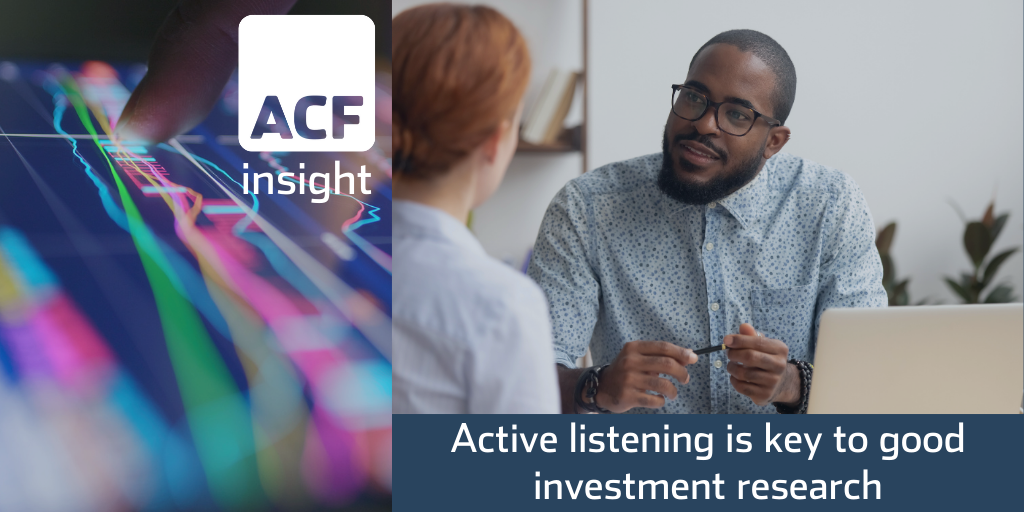Top investment research starts with active listening
To be a top investment research analyst requires a well-rounded skill set. One of these many skills has become particularly relevant in recent months because of Zoom and MSFT Teams – that of active listening.
But what does it mean to be a good listener?
- The Greek philosopher Zeno of Citium’s quote is once again in vogue “We have two ears and one mouth, so we should listen more than we say.” This sentiment can occasionally seem contradictory to investment research analysts…as we also are required to do an awful lot of talking – though some audiences may feel investment analysts should do less!
- Richard Mullender (ex-British police, ex hostage negotiator and now businessman) says that listening is not just about nodding your head or keeping eye contact. A good listener looks for facts, emotions and indications of the speaker’s values – top investment research analysts do this all the time as a matter of course.
- Active listening is not always an innate skill for those thinking of investment research as a career, but it can certainly be developed. One silver lining to lockdowns and Covid-19… Many individuals have had work-from-home thrust upon them, but this provides both a good opportunity and strong motivation to develop active listening skills.
- How to train? Some firms use the “listening circle” technique – one person talks at a time without any interruptions from the others. This allows individuals to talk openly and honestly about issues they face (e.g. with colleagues). You will only get the best answers for investment research preparation if company management believes you are actively listening to their answers.
- A Harvard Business Review study, from May 2018, (The power of listening in helping people), show that employees who took part in the “listening circle” suffered less social anxiety and had fewer work-related worries. This might seem a struggle for investment research analysts because of the competitive nature of the job, but in fact, it is even more important because of that competitive environment.
At ACF, we have observed that our team members, wherever they are based around the world and irrespective of their cultural or linguistic backgrounds, develop active listening skills very quickly. Though we maintain offices, ACF has always encouraged people to work from home as most people find it more productive which is good for them and our firm. We have over a decade of experience of working in this way.
Working from home as a regular part of a work routine makes active listening an essential skill (as does working in a team with diverse cultures and languages). Video calls are a particularly good tool for developing active listening skills and ACF preferences video over voice calling.
In the context of running a top global investment research firm, we have also considered information flow and commerciality in respect of video calling and active listening.
We looked at the difference in overall information flow between a video call and a face to face meeting. From an analytical perspective is there anything missing? We’d suggest even for our best investment research, not much.
We have also considered the commercial advantages to video calling for ACF’s investment research. We’d suggest there are commercial benefits for all- corporate, portfolio manager and investment research analyst.
Being a good investment research analyst
The best investment research firms produce products and deliver services that have many uses and roles. One of those roles is to process information and present it in a format that all types of investor and other interested parties can use to help inform their decision making, investment or otherwise. For investors, the output from investment research analysts that are skilled at active listening is likely to be more insightful, more accessible and more often right.
To deliver the best investment research analysis requires a broad set of skills, it is part science, part art and part luck (where luck is characterised as preparation meeting opportunity), active listening contributes to all three of these factors.
The stock specific global investment research firm has, in principle, two overriding responsibilities and one challenge:
The responsibilities are to the investor and to the corporate. For the investor, investment research must aim to give a balanced set of insights that makes the case for the future prospects and valuation of the company and to the corporate the duty is to represent that investment case accurately and fairly. The challenge is to understand and adapt to the range of cultures encountered around the world. For both the responsibilities and the challenge – active listening is key.
Far from being a contradiction, or indeed a conflict, global investment research analysts should aim to maintain a relationship based upon mutual respect with both the companies they analyse and with the investors they serve (it is not always possible, but it should be the aim). That mutual respect relationship is most likely to be achieved through the foundation stone of active listening.
Authors: Christopher Nicholson and Renas Sidahmed – Christopher is a founding executive, MD and heads up investment research analysis at ACF Equity Research. Renas is an award winning investment research analyst and part of the Sales & Strategy team at ACF Equity Research. See their profile here
















